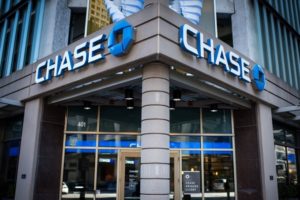
JPMorgan Chase has opened seven new branches in Greater Boston this year, and plans to open a total of 50 by the end of their regional expansion, including many in low- and moderate-income areas. Image courtesy of JPMorgan Chase
While larger banks like State Street, Bank of America and Citizens Bank control the majority of deposit share Massachusetts, other large banks have stayed away from this wealth-rich market, perhaps shy of becoming the next high-profile failure in the region.
Citigroup swooped into Boston with big plans in 2007, opening 30 branches. Eight years later, the company sold or shut down its remaining branches and left the city.
Now, there is growing interest in the region from large industry players, which will only increase competition in an already extremely competitive market and one of the most banked states in the country.
The Contenders Line Up
Executives at the parent company of Pittsburgh-based PNC Bank said on a recent earnings call that they are planning to soon launch a retail presence in Boston.
Bridgeport, Connecticut-based People’s United has purchased two banks in Massachusetts within the last year and JPMorgan Chase has already opened seven branches in Boston and its surrounding areas. It will open a total of 50 branches when everything is said and done.
“It’s too early to release deposit share, but I can confidently state that deposit and loan performance is exceeding the business case and our historical experience,” Roxann Cooke, regional director of New England at JPMorgan Chase, told Banker & Tradesman. “The customer experience and overall customer satisfaction is a critical measure of success for our new branches and the Boston and Greater Boston team is also exceeding expectations in this metric.”
A spokesperson for PNC declined to comment further on its planned expansion into Boston, but executives on a recent earnings call said they planned to “accelerate” the pace of bringing their new “solution centers” to Boston over the next 18 months.
These could spell trouble for competitors.
The size of a small branch, they mainly offer digital-only savings accounts that pay high rates in order to attract deposits. The bank has already launched these centers in the Dallas and Kansas City markets, and has reported great success.
Karen Larrimer, head of PNC Retail Banking, said in an interview with Reuters in October of 2018 that the bank was planning to spread the solution centers across Dallas and Kansas City so there would be an office within a 30-minute drive of 80 percent of the population in each metro.
People’s United has also made moves to up its presence in Boston and Western Massachusetts. In November of 2018, People’s United announced they would acquire the $3 billion-asset Belmont Savings Bank and its six branches in the Greater Boston area.
Then the bank recently acquired the roughly $7 billion-asset Hartford-based United Bank. Although United is based in Connecticut, it has a robust presence in Western Massachusetts with more than 20 branches.
Is Chase Making Headway?
The FDIC had not yet released new deposit share numbers by the time Banker & Tradesman went to press, but Chase has been aggressive in its regional marketing efforts.
At its first branch in Boston, Chase in February offered some customers up to $600 to open a checking or savings account, a very high promotion even for the Boston area.
Cooke said the bank has used window clings, direct mail, banner ads on MBTA buses and other outdoor ads, designed chiefly by local artists.
The bank has also invested in various partnerships with Boston institutions including the Museum of Fine Arts, the Boston Calling music festival and the Boston Symphony Orchestra’s Tanglewood Summer Series. Coming up, Chase will also have branding at the Emerson Colonial Theatre and the Blink! Holiday Light and Sound Show at Faneuil Hall, she said.
Cooke said Chase’s Dedham branch shows its strategy is succeeding
When it opened in December, she said, some customers said they had driven from hours away to open accounts at the branch, and many said they had anxiously awaited its arrival. Chase has also found success in the residential mortgage market, Cooke said.
“We know they are here and keep looking over our shoulder, but we have not seen or felt any impact from them. And we have no market share numbers yet from the FDIC, so I really don’t know how they are doing,” Dedham Institution For Savings President and CEO Peter Brown said. “However, we do see Chase Mortgage out there with some very aggressive jumbo mortgage rates, which gives them really good cross-selling opportunities. That’s something they are really good at.”
Data from The Warren Group, publisher of Banker & Tradesman, shows that Chase has originated about $315 million worth of residential mortgages in Massachusetts through the first six months of 2019, about $30 million higher than the bank did during the same time period last year. On strictly purchase mortgages, Chase was up nearly $50 million in 2019 from where it was through the first six months of 2018.

Bram Berkowitz
Asked whether the bank could eventually compete with the likes of Bank of America or State Street, the top deposit share-holders in Massachusetts, Cooke said it’s hard to tell this early on, but she feels very optimistic about the bank’s future in the area.
“A shakeup is not going to happen overnight,” she said. “But I can say that we are here for the long haul and Chase is committed to supporting Boston and the surrounding communities.”




 |
| 

